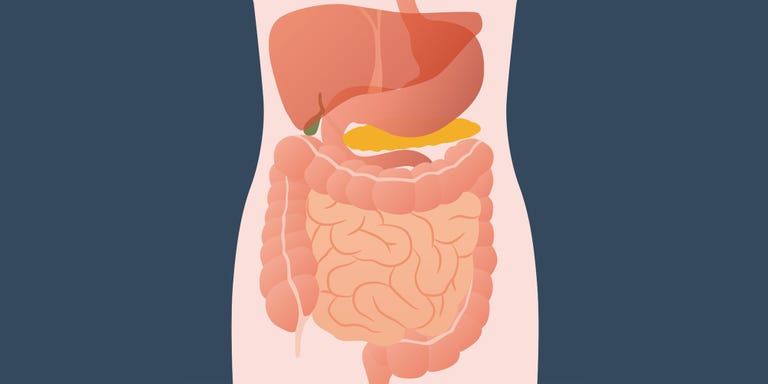
Realistically speaking, there are tons of things worse than stomach issues.
But honestly, when you’re in the thick of it with irritable bowel syndrome—the cramping, the diarrhea, the constipation (sometimes all three!)—literally anything else seems preferable.
But uh, what exactly is IBS, how do you know you have it, and, most importantly, why TF is it so miserable?
What is IBS?
IBS is a gastrointestinal disorder largely attributed to miscommunication between the brain and the gut, says Michelle Cohen, M.D., a board-certified gastroenterologist at Mount Sinai Hospital in New York. That’s right: There’s likely nothing physically wrong with your body, which is insanely frustrating.
“The brain and the gut talk to each other via something called the brain-gut axis,” she explains. “In IBS, signals in both directions can be misinterpreted, resulting in changes in the brain and changes in the gut that result in symptoms.”
IBS symptoms can be brutal
IBS symptoms are all just the pits, TBH—abdominal pain, diarrhea, constipation (sometimes both!), along with bloating and a whitish mucus in your stools. But a few of these stomach issues every so often does not IBS make.
About 12 percent of people in the U.S. have IBS.*
According to the National Institute of Diabetes and Digestive and Kidney Disorders, IBS is defined as recurrent abdominal pain linked with changes in bowel movement frequency and form, at least once a week for the past three months.
The condition is also broken down to subtypes based on these symptoms: IBS-C constipation type, IBS-D diarrhea type, IBS-M mixed type (you suffer both diarrhea and constipation), and IBS-U undefined.
Sounds miserable. What causes IBS?
“The causes of IBS vary widely from person to person,” says Lee. (Yep, nothing is really clear-cut about this disease.)
It might be genetic, or it might be triggered by something like changes in your gut bacteria due to an infection or after a course of antibiotics, says Lee.
ibs culture is eating all your trigger foods and still being surprised when you get sick
In all likelihood, it’s probably a combination of genetics, your environment, and psycho-social factors like life stressors or personality traits, notes Cohen.
Mental health issues may also play a role: “We know that there is a large percentage of patients who have IBS who also have underlying anxiety and depression,” says Cohen.

IBS also disproportionately affects woman (they suffer at almost double the rates that men do), so hormones definitely play a role in the disorder, says Lee.
Then there’s the whole diet thing—fatty or greasy foods, dairy, alcohol, and FODMAPS (short-chain carbohydrates present in artificial sweeteners, as well as fruits and vegetables) can trigger symptoms because they’re poorly absorbed by the intestines, says Lee.
How is IBS diagnosed, and what can I do about it?
IBS is a diagnosis of exclusion, says Lee; which basically means that doctors have do a comprehensive physical exam to rule out other underlying conditions—like thyroid disorder or inflammatory bowel disease—in order to make a diagnosis.
Once you have that diagnosis, you’ll need to work with a doctor to ID your triggers (like, if you notice symptoms after having dairy or at the end of a particularly stressful day).
Then, it’s all about managing this beast: If you have mild symptoms, you might benefit from OTC medications such as fiber supplements or laxatives (for constipation) or anti-diarrhea or anti-gas meds for the opposite, Cohen notes.
Me: this food is safe, this definitely won’t trigger my IBS, even though it’s pretty boring I’m so excited to eat this!
My IBS: think again bitch
If you have moderate or more severe symptoms that impact your life in a bigger way, your doctor might suggest a prescription medication like Viberzi, which can help reduce abdominal pain and diarrhea for IBS-D.
Your doctor may also enlist the help of a psychologist if your IBS seems to stem from a mental health condition, Cohen says. “Sometimes, if you address the anxiety, for example, you can help the gut.”
Regardless of severity, though, diet often plays a big role in the treatment of IBS, says Cohen. “For a lot of patients with IBS, food is medicine—and it’s about both what you eat and how you eat.”
If you have IBS you should be given a key to special toilet in all locations.
Often, people with IBS benefit from trying a low FODMAP diet. By eliminating certain foods with the carbohydrates, then slowly adding them back, you can ID triggers and move to a more modified version of the diet where you’re avoiding the foods that give you symptoms. “That can be very helpful for patients with IBS,” says Cohen.
Small meals—which are more easily absorbed by the body—are also better than bigger ones, which take the body a long time to digest, she notes.
But, something to keep in mind: Every single IBS case is different, so it’s crucial to touch base with a doctor if you’re experiencing symptoms.
What women with IBS want you to know:
“I’ve had alternating IBS for most of my life, but tended to hover around the IBS-D label for the past few years. It was so terrible that every time I ate, I had to make sure I was near a bathroom, long car rides were always tough.” –Reddit user agoraholic
“I’ve turned down SO MANY hangouts, family gatherings, trips, etc just because of my stomach issues. I know it might sound dramatic…but I’m feeling so frustrated because now that I think about it, I’ve quite literally lost friends due to this. I’ve pushed through the pain countless times but then I’ve ended up sitting on a couch on my side in pain looking like a Debbie Downer with people muttering “why did you even come if you’re just going to lay there?”” –Reddit user michywiz
“For the past year, I’ve struggled with IBS symptoms that were getting progressively worse and worse. It was a mixture of what I thought was IBS D and C, but mainly suddenly I couldn’t eat pretty much any foods without feeling sick. Anything. I was constantly bloated and in pain, exhausted, with the pain in my entire left side (all the way from the bottom left up to my rib cage).” –Reddit user terrificpie
*According to the National Institute of Diabetes and Digestive and Kidney Diseases
Source: Read Full Article
